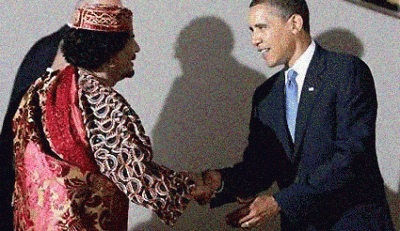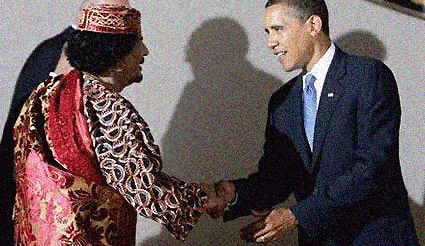 We’re honored to have Michael Busch dissecting the latest WikiLeaks document dump for Focal Points. This is the forty-second in the series.
We’re honored to have Michael Busch dissecting the latest WikiLeaks document dump for Focal Points. This is the forty-second in the series.
As US embassy cables from Libya continue pouring out of the WikiLeaks archive with each new day, the whistle-blowing group yanked the faucet off this afternoon, reducing the deluge to a drip. A single document, dating from May 2009, was released by the group, describing a meeting between Muammar Qaddafi and AFRICOM Commander William “Kip” Ward which naturally took place in the Libyan dictator’s trademark tent in Tripoli.
Not like they need it, but if any of Qaddafi’s sons take up the Boston Review’s suggestion to shoot “S**t My Dad Says: Libya Edition,” this cable will offer them yet more material. From carving up Switzerland to initiating a multilateral pirate peace process, Qaddafi treated Ward to a glimpse of the vagaries driving his distorted understanding of world affairs. And yet, before Qaddafi’s train of thought runs off the rails, the cable records some remarkably prescient and ironic observations from the Libyan leader on his region’s politics.
After exchanging pleasantries, al-Qadhafi noted that during Gen. Ward’s earlier trip to Libya, he had been visiting Mauritania, where a political crisis was ongoing. “Every time we put out a fire in Africa, another one breaks out. We used to say this was a US conspiracy, but not anymore.”
Qaddafi then described, at great length, the evolutionary anatomy of Middle East and North African regimes
during which he related the stages of governance in Africa from revolutionary liberation, to dictatorship, to multi-party elections.
Not clarifying his own government’s position in this schematic, nor seemingly concerned that the winds of change would whip against the walls of his army-issue tent anytime in the near future, Qaddafi concluded
that now was the time to establish common African institutions, such as a Ministry of Defense, that would better represent African interests before the world.
Up next on the Libyan ruler’s talking points memo: China.
Al-Qadhafi turned to U.S. and Chinese involvement on the continent, characterizing the Chinese approach as soft, the U.S. as hard, and predicting that China would prevail because it does not interfere in internal affairs. He criticized what he said was a U.S. tendency to place military bases near energy sources, observing that [if] the U.S. did this in the Gulf of Guinea, it would spark terrorism. Turning to the Israeli-Palestinian conflict, al-Qadhafi questioned what he characterized as U.S. support for Israel at the expense of Palestine, and advised that it would be in the best interest of the U.S. to support the Palestinians.
Immediately on the heels of this advice, Qaddafi unceremoniously attempted to corner the market on influencing US policy in the Middle East.
He cautioned against trusting the advice of Arab leaders in the Gulf and Levant and offered to play a role in that region if the U.S. desired. The Leader concluded his remarks by expressing a desire for President Obama to come to the African Union Summit in Libya in July, and after that meet him in Italy at the G-8 conference.
The conversation between Warden and the Libyan leader takes a surprising turn when
In response to Gen. Ward’s profession of respect for the sovereignty of African countries, al-Qadhafi said he understood the U.S. position, but questioned the U.S. military presence in Djibouti, noting military power would be used by extremists to justify terror.
He then
proceeded to identify two sources of terrorism, Wahabism and Switzerland. Qadhafi stated that the Swiss banking system was used to fund terrorists, and proposed that Switzerland be split among its neighboring countries according to language.
A fine idea, indeed.
From there, the conversation continues down the bizarre highway of Qadaffi’s self-aggrandizing imagination into a discussion of his plans to solve the pirate problem in Somali waters.
On the topic of Somali piracy, al-Qadhafi asserted that “foreign entities” had violated Somalia’s territorial waters. The solution to the problem of Somali piracy was therefore to forge an agreement between the countries exploiting Somali waters and the pirates. Al-Qadhafi offered to identify a pirate spokesman and broker this agreement.
The meeting concluded with Qaddafi emphasizing
that as Libya now presides over the AU, there was a possibility for cooperation with AFRICOM in combating terrorism in the Sahara and piracy. He said that he could deal with “the new America without reservation”, now that the United States was governed by “a new spirit of change.”
That may be. But as we’ve seen, for Qaddafi, it’s one thing if foreign leaders are possessed by the spirit of change. It’s quite another when that same spirit drives Libyans into the streets demanding his removal.
